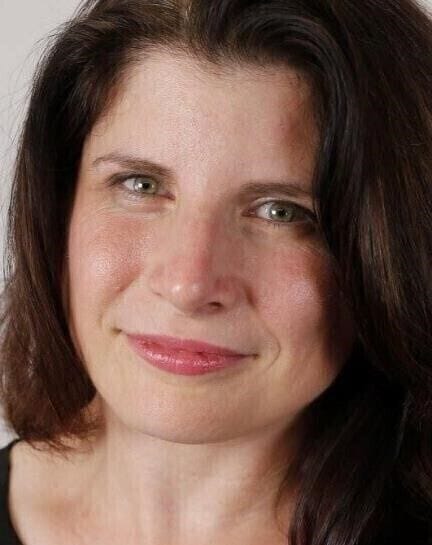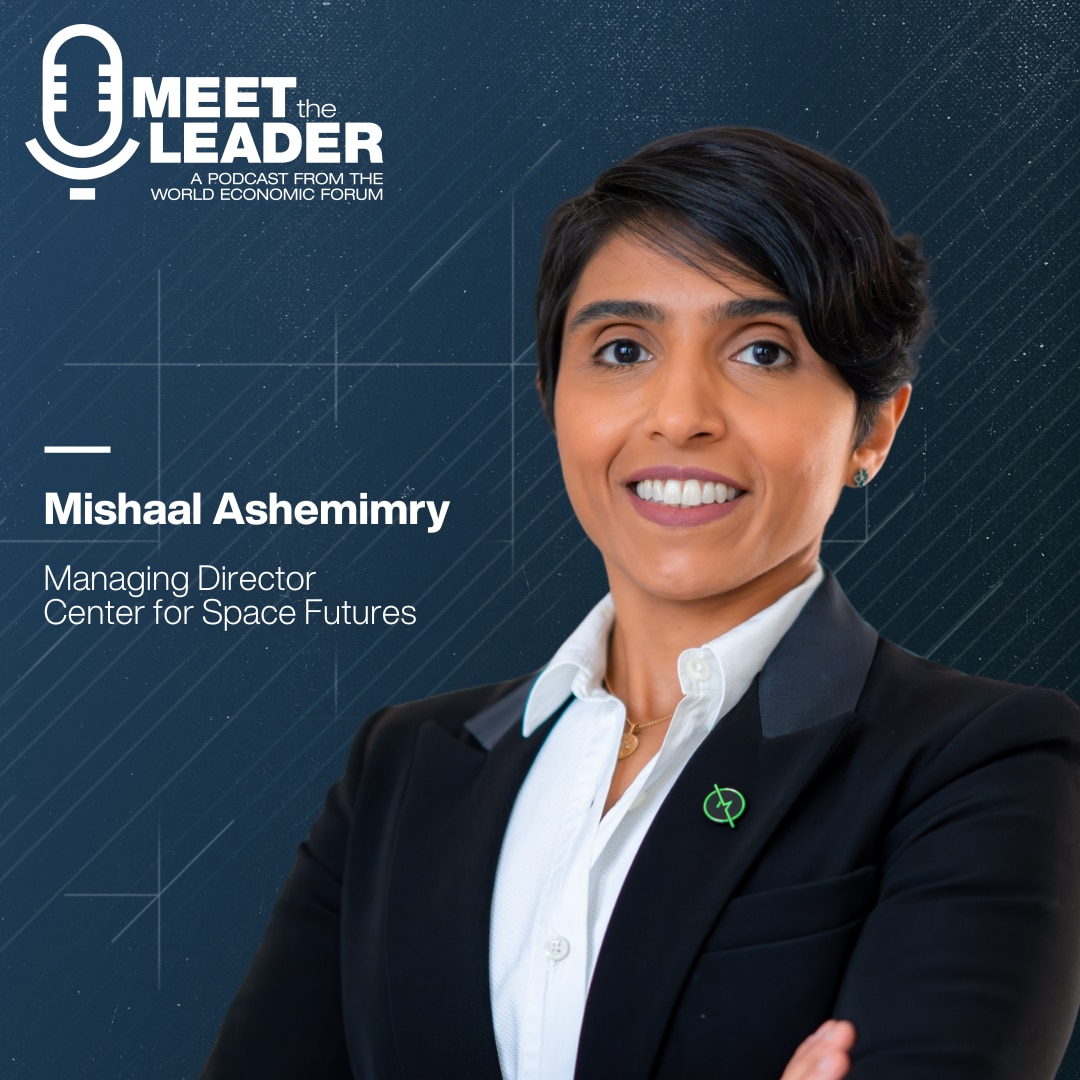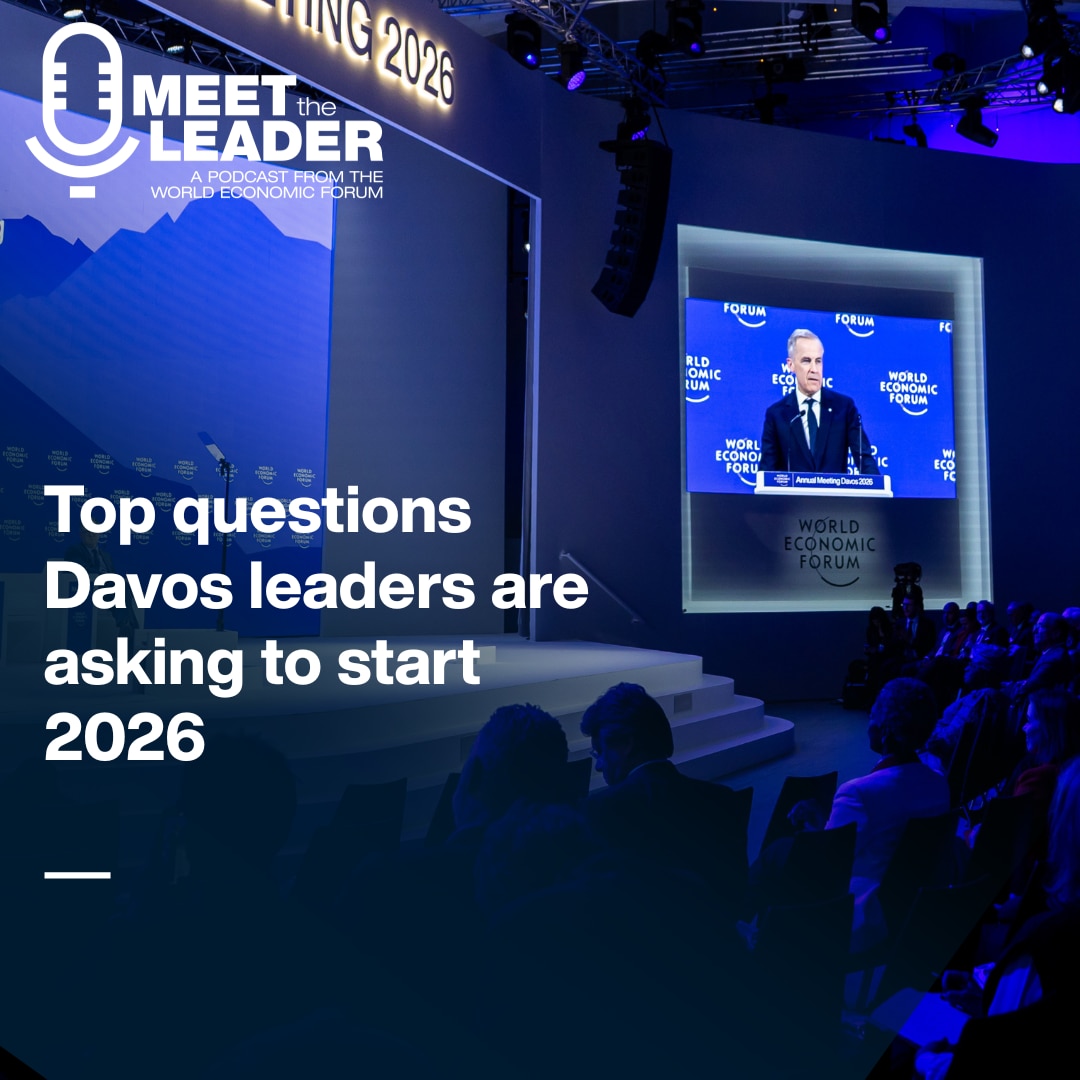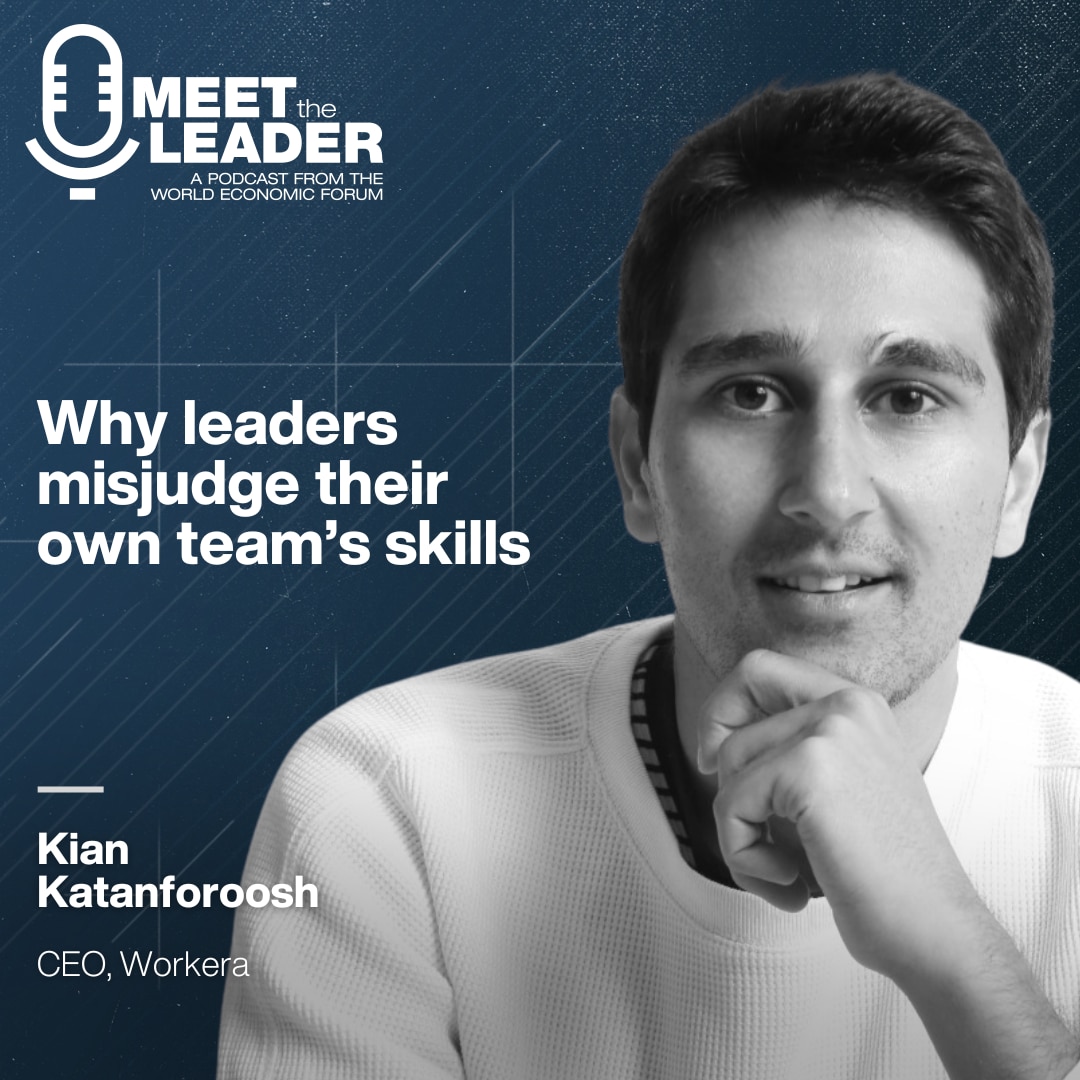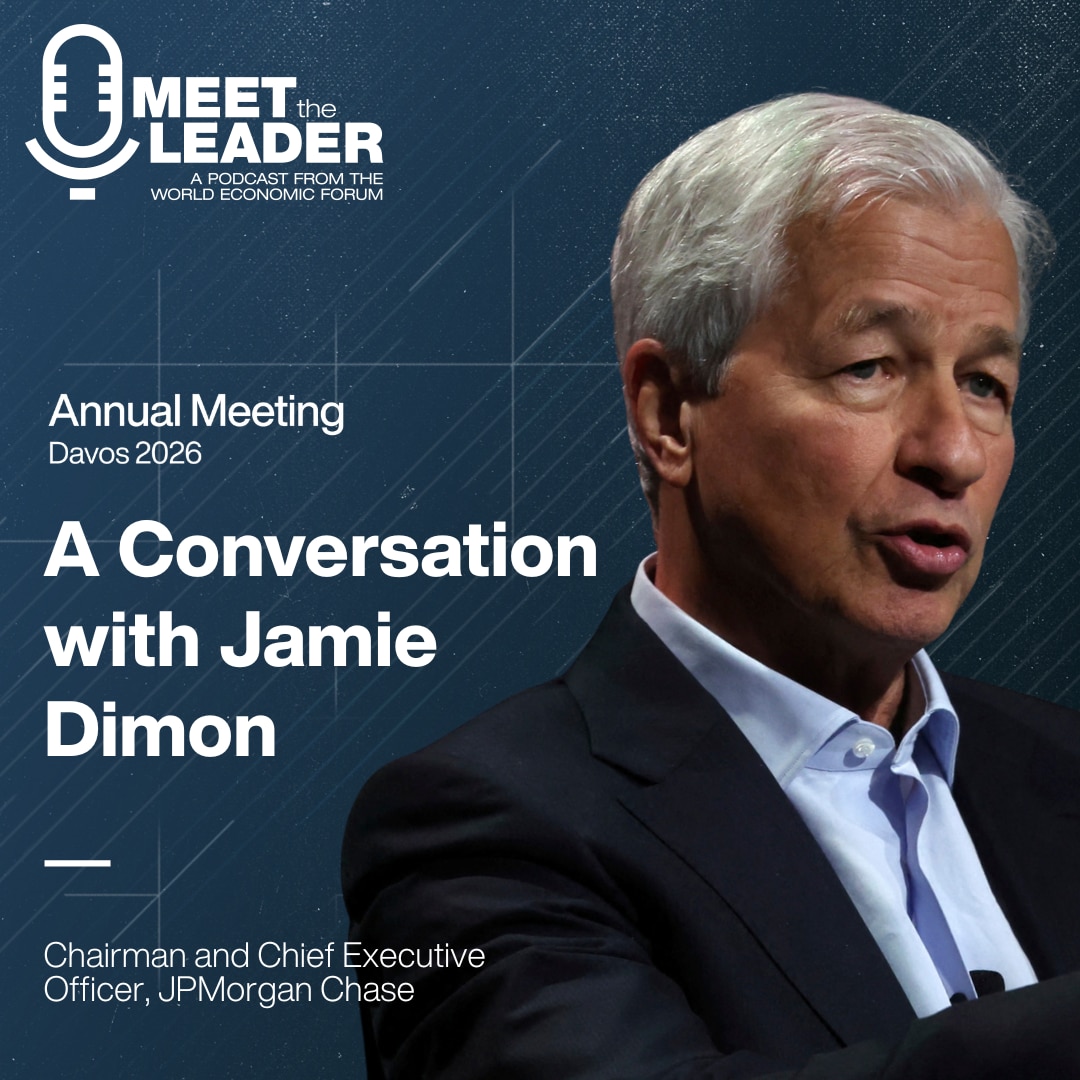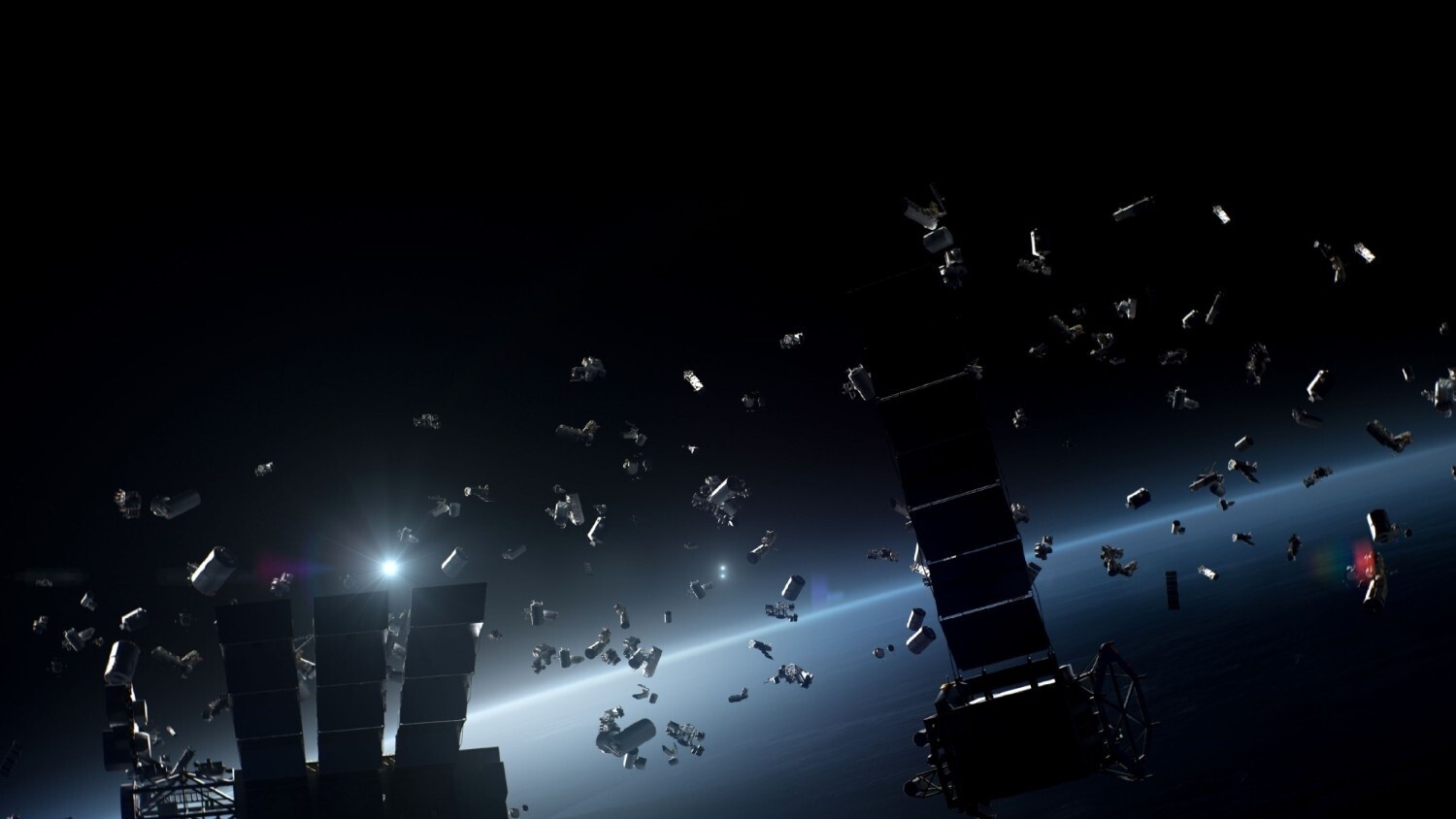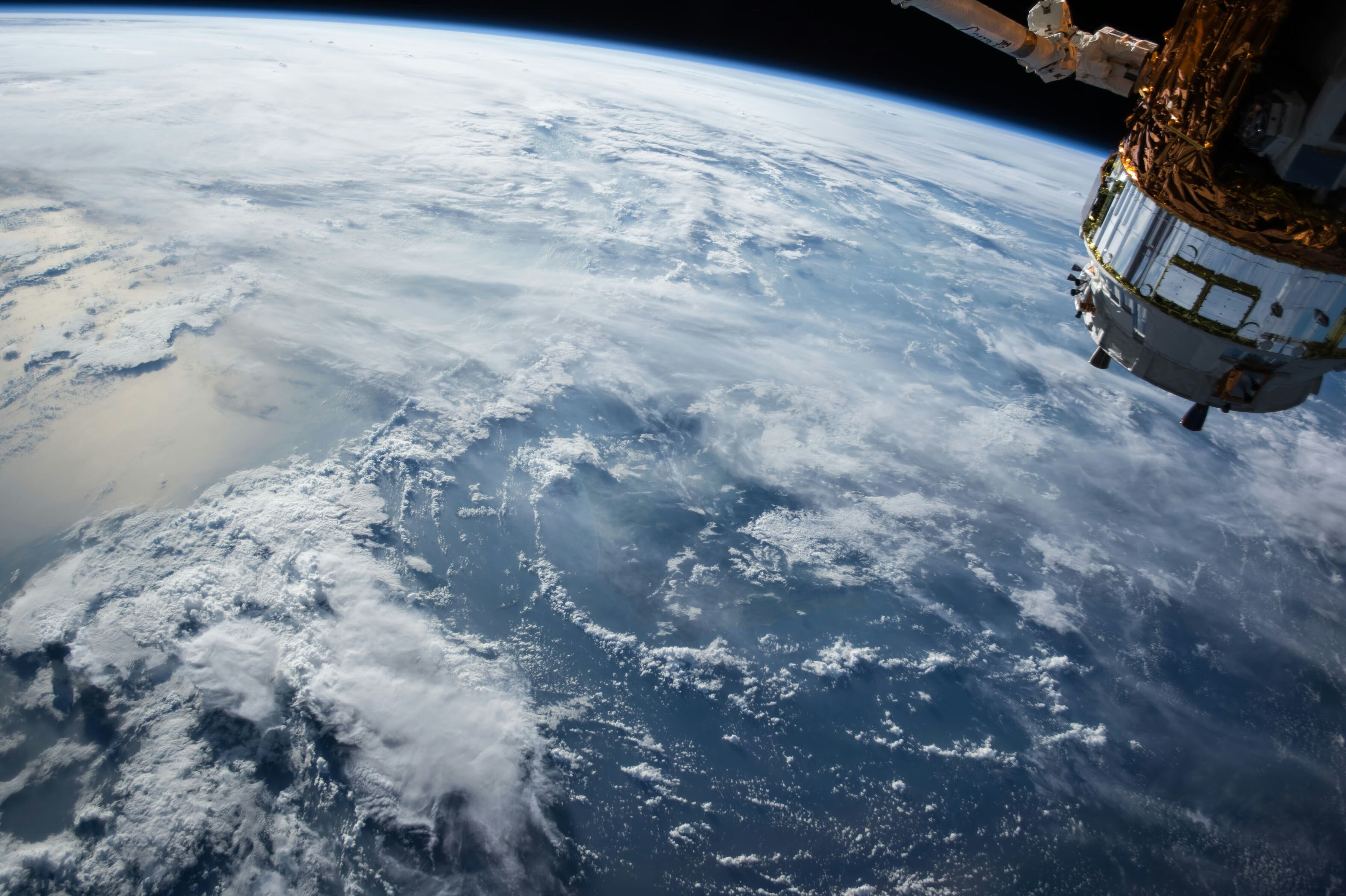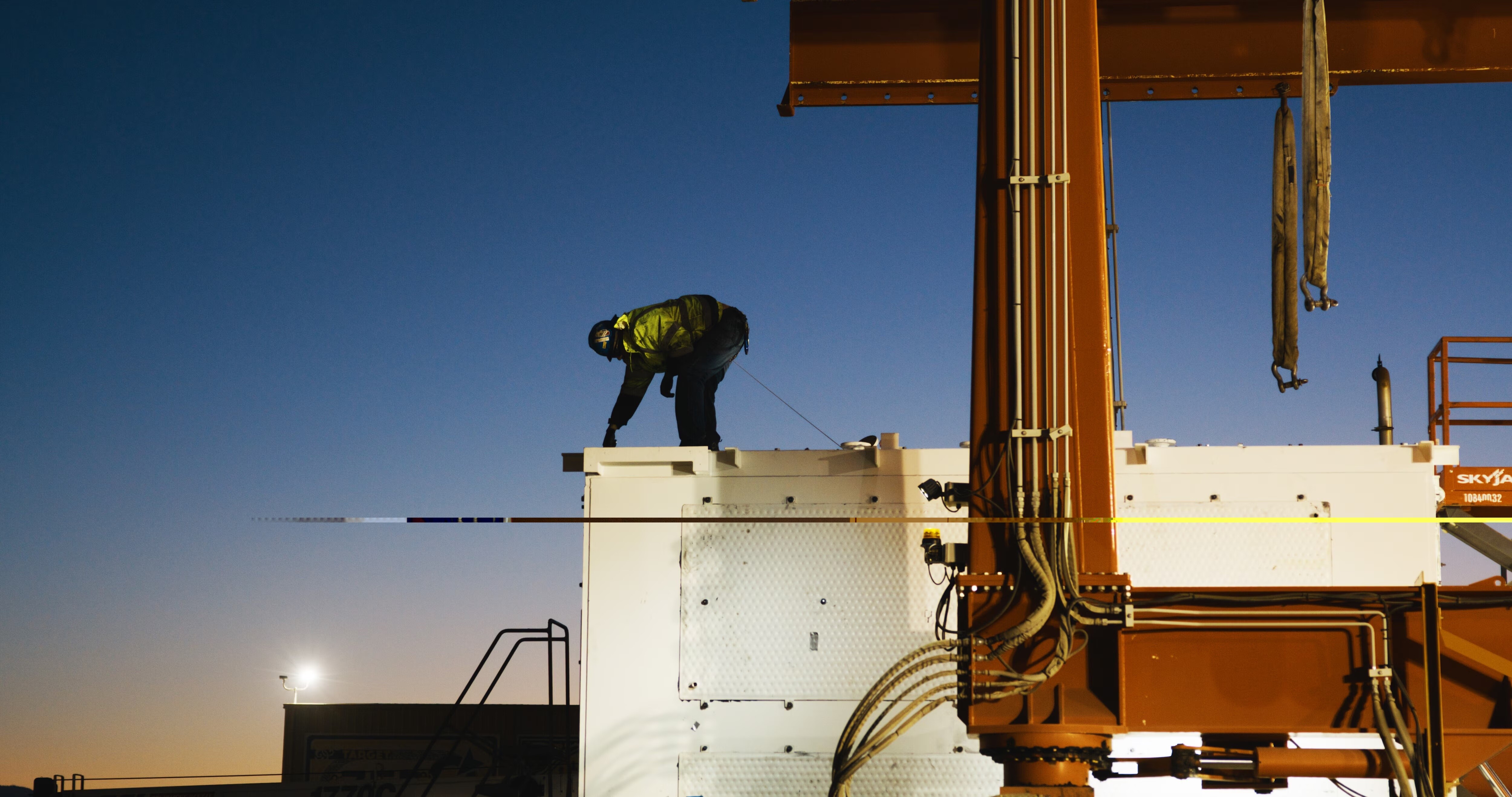European space chief on speaking to inspire - and making big change possible
Transcripción del podcast
Linda Lacina, Meet The Leader: Welcome to Meet the Leader, a podcast where top leaders share how they're tackling the world's toughest challenges.
Today's leader, Josef Aschbacher the Director General of the European Space Agency. He'll talk about how space is helping us tackle everything from climate change to more resilient economies. And what's needed to build support to make big visions a reality.
Subscribe to Meet the Leader on Apple, Spotify, and wherever you get your favorite podcasts.
And please take a moment to rate and review us. I'm Linda Lacina from the World Economic Forum, and this is Meet The Leader.
Josef Aschbacher, ESA: Sometimes we, especially in the space community, are considered a bit alien because we are very exotic what we do. But we have to make it understandable for everyone. And if I cannot inspire a little girl or a little boy, then I think I'm not doing a good job. And I think this is what we really need to do.
Linda Lacina, Meet The Leader: Much of your daily life depends on something you don't think that much about. Space data. In fact, without it, a lot of things would just stop cold. It'd be harder to fire up your favorite TV show, of course. But more importantly, satellite data helps farmers grow crops, preventing hunger and helping them be better stewards of the earth and its resources. Satellite data is critical in disaster management, general security, and it plays a key role in keeping economies from collapsing.
But while so many innovations space makes possible are important to our everyday, they can still seem exotic, like science fiction. Or worse, they can just seem invisible. That invisibility is one of the core challenges faced by Josef Aschbacher, the Director General of the European Space Agency.
He needs to build support for innovations that are hard to understand sometimes and take decades to build. All with the support of politicians and leaders whose terms will end along before that project is completed.
Of course, getting buy-in for big visions is a challenge that any leader making big change happen knows well. Josef talked to me about the strategies he's learned while at the European Space Agency, or ESA, to build support and how he talks about technical marvels in a clear way without jargon that sparks inspiration, trust, and excitement.
He also shared more about the $350 billion and growing space economy and the initiatives that will foster new businesses that can help ensure space will continue to strengthen economies and protect the environment for years to come.
He'll talk about all that, but first, he'll tell us a little bit more about satellite data
Josef Aschbacher, ESA: Everyone worries about climate and climate change and all the impacts and very few people know or realize how much space contributes to understanding climate change. It is fair to say that without satellites it would be very difficult to understand how global climate change works and how it affects us all on this planet.
So just to give you maybe a few numbers about there is an organization called GCOSS, the Global Climate Observing System. And they defined so-called essential climate variables that these are parameters that are important to describe climate change. For example, sea surface temperatures, sea level height, or CO2 concentration. All these parameters that describe how the climate changes.
About half of them or more than half of them, you can only measure from space, from satellites or best from space because you have a global information that really comes and provides this information. So, yes, space can certainly contribute to understand our planet, our system, how it works from the atmosphere, the oceans, and the land, and how this system interacts.
And in order to really understand our climate, of course you need observations. But then of course the next question is what do you do from the understanding? How do you go towards prediction, simulation, forecast of different situation.
Linda Lacina, Meet The Leader: A new generation of meteosat satellites recently launched. Can you talk a little about why this new generation is so innovative and why they're so important, especailly for the climate?
Josef Aschbacher, ESA: We just launched this new satellite called MTG (meteors at third generation), so it is continuing the measurements since 1978. So for many decades, but it's the third generation that means a new type of satellite measuring parameters of our planet. So what it does, it's a geo stationary satellite that stays over zero zero, that means zero degrees north, zero degrees east.
And from there, scans to Earth all the time. It takes about 10 minutes to scan the whole disc of our Earth from South Pole to North Pole and really collect this data. So it is doing this every 10 minutes. Of course we can focus into certain areas like Europe and then we have a higher repeat rate for disaster management, disaster monitoring, for example, if there's a flooding or similar things.
So yes, this is a new satellite, actually it's quite powerful for two reasons. Of course it has new instruments, much more advanced instrumentation. But also it's a new concept. The previous satellites, they were spinning and the sensor was touching the Earth about 5% of the time while this one is stabilized and therefore can look at the earth all the time. And this really allows us to, to scan our, our planet all the time.
The instrumentation is very accurate. We measure different parameters of the atmosphere which we need for weather forecasts, but also lightning, how many lightnings we have, because they're very important to understand the energy cycle because there's discharge between the clouds and the earth surface, and all this is needed in order to really measure that.
So yes, it's the new generation and it's actually the first one of six satellites which we're going to launch one after the other which will really bring measurements for the next 20 years or so. It's really a new generation opening now, a new avenue of measurements, very accurate ones, for weather forecasting, but weather forecasting means also understanding our Earth system for climate predictions.
Linda Lacina, Meet The Leader: And with that data in place, there's sort of knock-on effects then for industry, for farmers. Can you talk a little bit about what could change with sort of a better access and then handling of new data?
Josef Aschbacher, ESA: It's very Important for every parts of daily life: agriculture, fisheries, ship routing, tourism. There are many segments that really depend on good weather forecasts.
About one third of the European economy is depending on weather forecast. And the impact economically is huge. The impact on the global economy -- It's quite significant. Of course, we do this with our European satellite in cooperation with the United States with India, also with China. So really there's a network, with Japan, a network of different satellites, so that measure these parameters. We exchange data with our partners and therefore we use them for misunderstandings.
But yes, absolutely. The quality of the weather forecast has a huge impact on the economy, and therefore, yes, it's extremely relevant, not only for climate understanding, but also for our companies, farmers and basically every single citizen.
Linda Lacina, Meet The Leader: Why do you think that connection isn't sort of more known?
Is it that space just, seems invisible or so much of a thing of science fiction in many people's lives. Why do you think that people aren't really thinking about that connection?
Josef Aschbacher, ESA: It is true that space is a bit exotic to many people, but very few people realize how much they're using space data or space information every single day. I mentioned the meteorology for weather forecast. Everyone wants a good weather forecaster. That means good, reliable data.
But also for other things, for agriculture, for disaster management for shipper routing, for climate change studies, but also for navigation for telecommunication.
Very few people realize how much they're using space data or space information every single day.
”If people are watching TV, they don't realize that they will be also using satellites in order to get this TV channel from one continent to the other, or from one place to the other. So yes, it's really used in everyday life. Sometimes I say, If we would switch off satellites just for one day you cannot imagine what would happen.
I mean, the whole economy would collapse. The world wouldn't function. Many accidents would happen because navigation and telecommunication are necessary to make sure that you know where you are and inform not only people, but also trains, airplanes, cars, and many other things. So yes, space is It's essential for daily life.
But also, and this is something that becomes more and more important now, for security, because space and security, of course, are necessary in order to really protect our people. And I don't need to explain the situation here in Europe or in front of our door where we have a very ruthless war going on.
And yes, space is absolutely important. To inform people, to protect people, and to ensure security of people in the wider sense.
Linda Lacina, Meet The Leader: ESA has a special initiative with EuroConsult and it has to do with space and space economy and startups. Can you tell us just a, a little bit about why that is important and sort of how that can also maybe play a good role in the climate crisis?
Josef Aschbacher, ESA: It's a very good example, you mentioned this agreement with Euroconsult. They are a consultancy company to really look at economic aspects of space. And let me just give you a few numbers today the space economy is roughly worth $350 billion USD globally.
Which is quite significant. But there's more and more private money flowing into space economy and this figure is increasing, for example, private investors or private people investing today some 13 billion euros in, in the space economy. The share in Europe is much smaller still than in the United States, but there is more and more private money flowing in.
So this commercialization of space that it's not only public entities like NASA or ESA or other national government space agencies that are working in space. No, it's also the private sector that comes in more and more. For example, in Europe we had an increase of 95% of private funds into the space economy in 2021 compared to 2020.
So it's really doubling or it's really increasing very rapidly, and that's something I really would like to foster to increase as the Director General of European Space Agency to make sure that new businesses are being created and people basically can make use of this space infrastructure, which is enormous and which is very powerful and very useful for people.
I have a very strong drive of commercializing or in the commercialization of space, and that's something extremely important in this contract you mentioned is one element in this segment, but also to team up with venture capital companies and private investors is something I'm really focusing on.
Linda Lacina, Meet The Leader: What other capabilities need to be built for that? I mean, you were talking about like sort of a, one of these partnerships, but what else, what needs to, to happen to make sure that we can scale that?
Josef Aschbacher, ESA: First of all, there's a, a large amount of investment coming from the public sector, I mentioned NASA, I mentioned ESA, but also other space agencies, and that's huge.
And as you said, not everyone knows how much can be done, but also much of this information is needed to create new businesses. companies, new startups new information flows that are, that are creating new data that are being sent out.
And there's a huge new ecosystem that is being developing and establishing through this space data that are being provided. Let me take the example of earth observation. We have in earth observation in Europe, we disseminate 350 terabytes of data every single day to the people worldwide of every information that we get from our earth observation satellites.
That means our satellites monitoring our planet for free to everyone. So everyone who wants to use this data can get them for free of any place in the world, and that's quite unique. As I say, we disseminate all this data, but this also creates new opportunities. Of course you really add value if you then combine these space observations with forecast models in order to really predict situations and estimate what is the impact of a certain disaster or a certain agricultural production on a certain area, on the people.
And this is of course, a very important very important aspect. What we do, we call it digital twins of our planet. And to create these digital twins that allow you to simulate our planet is the future.
Linda Lacina, Meet The Leader: What could hold any of this back any of this growth, any of this advancement?
Josef Aschbacher, ESA: Of course it is a new discipline and in order to, for this discipline to, to really penetrate into the economy, it takes time because people don't know or about the capabilities of space. Many people are not exposed. Many people think it's just too complicated, and therefore it needs top experts to, to work with it.
It's getting simpler and simpler, and these data are getting more and more user friendly. So I think it's a matter of time until the use of this data is much more widespread. But yes, you are absolutely right. Today, there's still not the full potential utilized because much more can be done if we really bring this to the economy, to small and medium-sized enterprises, to private people who are using it for all kind of applications.
Linda Lacina, Meet The Leader: Are there any other applications maybe we haven't mentioned that you're just really, really excited about the potential that, you know, that we just haven't covered yet?
Josef Aschbacher, ESA: Of course when you talk space, you talk astronauts, you talk exploring the moon, the Space Station or Mars.
And that's of course something that is also exciting and is the inspiration that is created there to really explore new dimensions. The Space Station is now running for more than 20 years very successfully. All the experiments that are done, all the research that is done is really penetrating into daily life.
And there's a lot of spinoffs that really are used by people every single day. But there also, also many other things. I mean, look at the moon as the next economic zone. What sometimes is underestimated that the moon is like a new continent. Like we discovered a new continent 500 years ago, which now turns out to be the United States of America.
And certainly this exploration of a new continent is also something that space, of course enables. Because we do go to the moon. We will set base there, there are minerals, there's water, there's ice we can build infrastructure. With 3D printers, it's all a bit futuristic, but this is things that is coming up now and certainly very exciting and something that we are working on quite intensely.
Linda Lacina, Meet The Leader: We are facing a, a polycrisis and what I'm wondering is you know, is there one particular aspect though that you think people can't lose sight of within this poly crisis? What comes to mind?
Josef Aschbacher, ESA: It's almost frightening how many crises we are seeing right now from COVD to the war, to the inflation, and several other crisis. And yes space of course is in the midst of it. But I just had a, a conference with the ministers of European space agencies, member states at ministerial level. And what I, what I was explaining was why space is so important during time of crisis. Because in a crisis what you need to do, first of all, you need to have access to information that is crucial, that is critical.
I mentioned security before and security, but also independent access to information is, is crucial for that. So therefore, because we are in a crisis, we need to invest in space to get out of the crisis much stronger. For reasons of daily information, which we need, but also because we need to invest in the future.
And investing in the future helps you getting out of a crisis stronger.
Investing in the future helps you getting out of a crisis stronger.
”Linda Lacina, Meet The Leader: A theme of the Forum basically, since the pandemic has just been this theme of resilience: how can we build resilient governments, resilient organizations? In your mind what does resilient leadership mean? What are the hallmarks of it?
Josef Aschbacher, ESA: I mean, the hallmarks of resilience really is to estimate what's coming in terms of different foresight scenarios.
And really prepare for them. Of course nobody was predicting a war. Nobody was predicting the covid crisis. But there are people, and I have some of them in my organization who are looking into foresight scenarios. And you really have to look at them and they may sound extreme today, they may sound not plausible today, but you have to assess what would you do if such a crisis would come?
And then of course, prepare yourself through infrastructure, through telecommunications networks, through navigation networks, through resilient systems that are resilient in the sense of having backup solutions in case one element is damaged or is falling out, and how can another one replace.
So yes, this resilient infrastructure is more and more needed, and we see it every single day now with the war in the Ukraine, where we need resilient systems and space is one way of providing this resilience, so especially in communication, but also observing what's going on down on the, on the war zone and providing images and this is has been helping enormously our colleagues and friends in Ukraine to really sustain this onslaught of war which they are facing. And information resilience in terms of infrastructure is, is crucial to help them gaining the upper hand.
Linda Lacina, Meet The Leader: Of course space, there's the exploration element. There's the innovation element. A lot of it is a, a bet, a leap of faith sometimes, you know and sometimes you will, face barriers or, or you'll hit a wall and in the moment sometimes may not know how you're going to get past it. Have you faced a moment like that and if so, how did you get through it?
Josef Aschbacher, ESA: I mean, we are facing this I would say almost every single day. Yes. If we have major decisions or major programs, for which we prepare. It is easy to excite people with space because you know, it's so inspiring, but the difficulties that the result will not come before, say 10 years or so, because you are building up infrastructure.
If you build a, a big satellite, or a big rocket, or a space station or if you go to the moon, that takes 10 years, sir, or even longer. So to really have a decision maker whose term, whose mandate is only four years maybe, convinced that you need to invest in this future engagement because it's good for the economy, it's good for the people, but maybe after his term ends and maybe for his successor or maybe even the one afterwards, it's very difficult to explain.
And that's something I struggle sometimes to really make people aware. Yes, this is needed, this is so important. But unfortunately, this hardware, which we are developing can only be delivered in 10 years from now, which means two legislative periods after the, the decision makers making the decision.
And that's a challenge, I have to say. Thankfully, sometimes people are visionary and understand the importance and therefore make decisions, but yes, this is certainly a challenge.
Linda Lacina, Meet The Leader: What have you noticed is maybe helpful sometimes when you're trying to break this down and explain things to people?
I remember when I was talking to Al Gore actually for the podcast, he had said that he learned that he had to change the way that he talked about the climate, because when he first started to talk about it he had a lot of detail and a lot of research, and sometimes he would maybe overload people with information and things that he thought were interesting.
Maybe, you know, they, they weren't there yet. Right. And so it helped him steer how he kind of leads and how he talks about the climate today. And so given, given that sort of spirit, are there things that you've discovered as you've been in this process? Well, when I do that, this, this gets me a little bit of growth, a little bit of momentum. Anything that you've discovered like that?
Josef Aschbacher, ESA: Absolutely. I mean, you just said it actually. I have a science background. And of course, as a scientist, you are very detailed. You are very systematic. You think in equations, you think in concepts and your mind is working very differently because the problem you have to solve is a mathematical physics problem.
But of course, if I talk to decision makers, politicians, it doesn't work. So I have to completely change my language and sometimes I, I think I have to really talk to, you know, somebody who is not at all having an academic education and I have to explain it to that person. And if I'm not capable of doing that, then I fail.
Sometimes I put my grandmother or, or my parents or somebody in front of me visually, and if I'm not capable of explaining to them what I'm doing, why this is important, and why they should say yes. At the end of the conversation that this is something that needs to be supported, then I think I fail.
And this is really completely rethinking. And I can I can certainly say that I've failed miserably myself at the beginning trying to overcomplicate things and not being clear to what is really at stake. And I think to simplify this message but still keeping the content right?
And knowing what, what is needed. I think that's a challenge, which I think is a big one, and I'm certainly considering this a very important one.
Linda Lacina, Meet The Leader: We mentioned earlier the, the many crises that we're all facing you know, simultaneously in your mind, what is the role of public leadership when we have all these crisis in an era like ours?
Josef Aschbacher, ESA: The role of public leadership is, first of all to have a clear vision of what needs to be done. Of course, you need to elaborate his vision, but to have a clear vision, express it very clearly to the people, not to myself, but to the people. And hopefully make them follow your vision and therefore understanding why this is so important.
So communication is key. Communication at all levels. Communication of course, to the experts so that recognition and respect for the idea is being supported. But also communication to the general public. And that's extremely important because the decisions of politicians is based on what they hear from the general public.
And I think this is something that we need to work on. Sometimes we, especially in the space community, are considered a bit alien because we are very exotic what we do. It's very fascinating. It's very complicated. But we have to make it understandable for everyone. And if I cannot inspire a little girl or a little boy, then I think I'm not doing a good job. And I think this is what we really need to do.
Linda Lacina, Meet The Leader: On that same note, you think about excellence in, in public leadership, are there signs or tells when you're like, you know, okay, that that's on the right track. Or people who do X or Y they usually are, you know, going to be successful, sort of getting a consensus and, and, and wide support. What are those, what does excellence in public leadership look like?
Josef Aschbacher, ESA: Excellence means that of course you have the good vision, but also you live what you talk and you are a role model for everyone inside and outside the organization. And I think this is key. People need to trust you. People need to believe in what you say is actually what you mean.
And I think this is all about clear leadership of course having a clear vision, a clear direction you want to go, but also acting and behaving in exactly that way. And I think this is what makes people trust you. But also you have to be you know people need to like you.
People need to like the way you communicate they need to get on board, on your message. Of course there's a huge process that helps you doing that, but yes, that's, that's exactly what is needed to basically live what you say or you would say Walk, walk the talk.
Linda Lacina, Meet The Leader: Exactly. Has there been an experience in your background that has shaped the way that you lead. Something that ever since then, you're like, you've really learned from that and, and applied that lesson and put it into practice.
Josef Aschbacher, ESA: I've learned many things along my way and I still keep learning. But let me mention one example in terms of content.
One of my previous steps in my career, I became Director of Earth Observation in the European Space Agency. So the position one level be below where I am now. And when I became. Director, I looked at the directorate, which is still almost a thousand people and a sizeable budget. But I looked at it and I, I assessed the weaknesses and the strengths.
The strength was, it's a very good one, very good output. But the weakness was, it was a bit I would say old-fashioned and was not was not recognizing the future challenges and what's happening in the world. This was about 10 years 10 years ago. So what I did, Of course when I talk to my people, I say, look, there's this new world happening, commercialization SpaceX and Spire and Planet and all these companies are doing things completely differently.
We have to adapt to this. We have to embrace and we have to learn from this. And of course, my peers who have worked in this domain since decades, that no, no, this is not for us. This is something else. And we don't believe that this will ever affect us. So what I did is I took them to Silicon Valley. We spent 10 days going from one company to the other, and we really went there and learned for ourselves how, how, how it works.
And I can tell you the most critical managers, senior managers, top experts in space who have been saying this is all no good, have become the biggest believers because they realize what's happening by seeing it and by really talking to these people.
And I can tell you, walking in a factory of rockets in SpaceX or seeing a planet another company was extremely successful today, but I'm talking 10 years ago. And seeing how they work and how they build up their products, their philosophy is quite eye-opening. And this was eye-opening for me, for myself as well, but also for my colleagues.
I think this is something extremely important. Bring people on board and make them part of it, and therefore they buy in and therefore, therefore they, they lead in what has to be done.
Linda Lacina, Meet The Leader: Is there a way that you feel like you have maybe changed as a leader since joining the, European Space Agency?
Josef Aschbacher, ESA: I was certainly an expert in using satellite data and working with them and more thinking in terms of physics and equations.
And I'm thinking very differently now because now more and more I'm talking to politicians to the general public to people that you know, who make decisions, big decisions but are not from the space domain. So, yes changing the way how you communicate is something that really have I would've, i have changed significantly. But also, of course, network with the people making sure that your goals, which you are which you're promoting, which you are believing in, are being accepted. And therefore, yes, a combination of communication, networking formulating uh, big programs and making sure that what you do is actually very sensible and helping people. Helping everyone.
Linda Lacina, Meet The Leader: Is there a book you recommend?
Josef Aschbacher, ESA: A book? There are several books I'm reading. There's one which is actually, which is more in the space domain. It's called Escaping Gravity. Lori Garver from NASA. She used to work for NASA number two in, in NASA. But she has really described how NASA changed drastically in adopting a much more commercial policy that it's called the CCP the, the Commercial Crew Program and the Commercial Cargo Program.
It's a big change which actually resulted in companies like Jeff Bezos' or Elon Musk's company in space and they really worked with them in a very different way. So that's something that interests me a lot because it's how you change a big organization and how you need to adapt to a new reality. And that's also very useful for me as well.
But there also other books. There's another one which I just started. It's called Silence in the Time of Noise. Also the title, I think says it by Erling Kagge who is an explorer. And he went on foot to the North Pole, to the South Pole and to the Mount Everest, so the, the highest poles of this planet all by on, on his own as an explorer.
And I had the pleasure of getting to know him. And I have to say it's extremely. Fascinating to talk to people like this who are pushing the boundary all the time. And he, an explorer is doing exactly that. And the book he, he was writing about silence of course says how he walks to the North Pole and what he feels about it and describes his exploration.
Fascinating. I can only highly recommend.
Linda Lacina, Meet The Leader: What would somebody take from that book if they were to read it? How would they change?
Josef Aschbacher, ESA: What do they change? That all the noise we make is just noise. And sometimes you have to step back and really reflect and think much deeper. I think that's what people should do much more.
Linda Lacina, Meet The Leader: That was Josef Aschbacher thanks to Josef and thanks so much to you for listening. A transcript of this episode and my colleague's episodes, radio Davos and the Book Club podcast is available at wef.ch/podcasts.
This episode of Meet the Leader was presented and produced by me with Juan Toran as studio engineer, and Gareth Nolan driving studio production.
That's it for now. I'm Linda Lacina with the World Economic Forum. Have a great day.
Josef Aschbacher's role as Director General for the European Space Agency (ESA) requires mobilizing support for visionary innovations that often take decades to build. He shared the strategies he’s learned while at ESA to talk about technical marvels in a clear way, without jargon, to earn buy in for big ideas and connect with a range of stakeholders from policy makers to children. These methods for sparking inspiration, trust and excitement can be critical to any leader making long-term change a reality. He also discussed the $350 billion dollar (and growing) space economy, sharing how a range of initiatives and shifts can foster new businesses and help ensure space will continue to strengthen economies and protect the environment for years to come.
Scroll for transcript
Alojado por:
Más episodios:
La Agenda Semanal
Una actualización semanal de los temas más importantes de la agenda global
Más sobre Cuarta Revolución IndustrialVer todo
Stefan Reuther
10 de febrero de 2026
